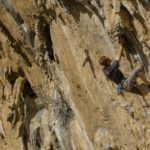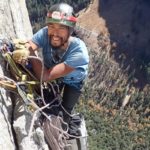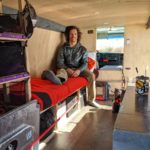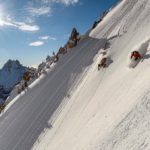
Lane watched restlessly as the autumn days got shorter. Every morning he drove south on Hwy 93, skirting along the ragged edge of the great plains, and every morning he made it another mile before sunrise caught the mountains. All he wanted was to leave.
The afternoons had become warm and still and the smell of dried grass lingered in the air, but Lane remembered when he had first returned to Colorado: how the winds had whipped down from the mountains, eating up the last of the dirty snow that had survived winter. When those gusts had come through his job site, he’d grabbed hold of the bare roof trusses, thirty feet off the ground, and it almost felt like he was hanging on that desert sandstone again.
Lane’s general contractor asked him to stay on for another project, and he said he would think about it, but the fall and winter climbing trip had become a pilgrimage. It was what he dreamed on. He wasn’t going to give it up, not even for a steady paycheck. There were too many mountains unclimbed.
The last day of September, Lane loaded his ‘93 Astro van with his gear. He’d bought it from the painters that summer and it still had a Martinez Painting Co. logo on the back and Lane laughed at the thought of parking it next to the Sprinter vans that had been showing up at his favorite crags. He put his stove in the drawer where the paint brushes had been, his pack on the hook that held the sprayer hoses, and across the pocked and rusty floor, he laid his old foam mattress. That night he lay against the back of the driver’s seat reading Edward Abbey stories, thinking about all the stone awaiting him in the next six months.
Unlike years past, Lane didn’t want to tie himself to one place in particular. He needed to keep it wild and open and free. Although he could wind up anywhere, he at least knew where to start: Devils Tower, Wyoming.
He rambled up the interstate, blasting music and paying no mind to the cars and trucks passing him in the fast lane. All that lay before him was high desert and rolling plains. The road was finally his and he would take it however he pleased.
Then ten miles north of Cheyenne, his mother called.
“So you’re off again?” she asked.
Lucille had been hoping her son would abandon the trip. But she was always hoping for him to change. Settle down. Find a stable job. A nice girl. A more conventional life.
Lane had turned thirty in July. It didn’t mean much to him, but his mother reminded him every chance she could.
“You know, you tell me that every time we talk,” Lane said.
“Don’t you think you’re getting too old to keep doing this?”
“What am I doing that bothers you so much?”
“Your father and I didn’t finance your college education to have you become some kind of hobo.”
“That’s not what—”
“Well, I don’t know what to call it, Lane . . . whatever it is you’re doing out there.”
Lane pulled the phone from his ear and looked at it in disgust. “It’s called climbing,” he said through his teeth.
Lucille huffed. “I know that much. But to give everything up for it, that’s what I don’t understand.”
She didn’t get it. And Lane knew she never would. Despite his best efforts to explain why he climbed, she had no interest in seeing beyond the comfortable suburban life that had been laid before her. His mother would never be at the base of a crag, craning up at a towering cliff in awe, knowing that it is possible to get up there. She would never be awake at sunrise in a singing valley, drinking coffee and blowing plumes of steam into crisp morning air, watching the sun burn a cold night off the high rocks. She would never seek out a challenge that takes every ounce of physical and mental strength, pursue it through doubt and pain and exhaustion, through a full-frontal showdown with failure, and push, push, push until that glowing triumph finally arrives, carrying armfuls of elation. No matter how many times he tried to explain it, his mother thought of climbing as a frivolous undertaking that would leave him, in the end, with little more than rope-burned hands and regret.
“Listen, mom, this is my choice. You don’t need to understand.”
“How are you going to meet any girls while living in a van?”
“What does that matter?”
“It’s just that relationships are so wonderful,” she crooned. “Someday you’ll want to have a family and children—”
“Mom, stop. Henry already gave you a grandson.”
Lucille’s voice softened. “I’m not comparing you to your brother.”
Silence filled Lane’s end of the line. They had had this conversation so many times now. They had gone in these circles for hours. The fastest way to put an end to it, he’d learned, was to stop talking altogether. His mother surrendered her questioning and changed the subject.
“Well, your father is gaining strength.”
Lane fidgeted in his seat.
“The doctor told us his heart is at 70%. It still has to learn how to work with the scar tissue, but he will be up and out of bed soon.”
The heart attack had crushed Lane. He was on a weekend trip in the Black Canyon when it happened—out of phone service—and when he returned, a swarm of hysterical voicemails awaited.
Lane had wanted to come home, but his father insisted he not. He didn’t want his son seeing him in that state. Lane’s father shared his wife’s distaste for Lane’s unconventional pursuits, and with his weak health, he chose not to burden himself with the stress of it. He let Lucille do the talking. Father and son still hadn’t spoken—and Lane could hardly bear it.
“Tell him . . .” Lane choked out. He peered at the clouds on the horizon, imagining his father laid up in bed. “Will you tell him I’m thinking about him?”
“Oh, honey. I will.”
Lane didn’t want to keep talking. What more could they say?
“Mom, can we talk later?” he asked quietly.
Lucille sighed. “Just promise me you’ll be safe, okay?”
“I will.”
“Promise me.”
Lane promised. He set the phone down and dug around in his bag until he found a half-empty pack of American Spirits. He cracked the window and smoked. It took a few cigs and a hundred miles more for Lane to feel at ease, but when he dropped into the Belle Fourche River valley the thought of his parents had gone completely.
Devils Tower lie before him, now, like a hallucination in the high desert. A perfect cylinder of stone jutting straight out of the plains, a thousand feet into the Wyoming afternoon. Lane rolled down his windows and let out a whoop. These were the moments he lived for!
In the visitor center parking lot, Lane held a finger to his forehead and stared at the angular columns. The idea of being up there made him giddy. Sightseers milled about inside, poking at the exhibits and applying sunscreen. Greg leaned over a diagram behind a spinning rack of postcards and Lane threw his arm around him.
“Greg-o!”
Greg started laughing. “There you are!”
The two friends shook hands and hugged and looked each other over. Greg was tall and thin and kept his long jaw clean. He wore wire-rimmed glasses that magnified his eyes and gave him a certain youthfulness that belied his intelligence.
It had been a year since they’d climbed together, but without pause, they picked up right where they had left off.
“How are you feeling?” asked Greg.
“I’ve been outside every day,” said Lane.
“Climbing?”
“My house was ten minutes from the canyon.”
Greg inhaled slowly. “I wish I could say the same.”
“Don’t tell me you’ve been holed up in that classroom all year.”
“I’ve been in the gym every single day, thank you very much.”
Lane smiled. “Oh, good. You can take all the scary pitches, then.”
“Now, hold on.” Greg put up his hand. “I’m only a scientist.”
“A rock scientist.”
“Well, that is true, I suppose.” Greg laughed. “Did you get a good look at the tower?”
Lane shook his head. “Only from the lot.”
They started down Tower Trail, which surrounded the monument. It gave them a perfect view of every crack running up the formation. Each fissure in the rock was another route to climb. There were hundreds, maybe thousands. They could only touch a handful in the five days they had—hell, they could have climbed for a month without repeating a line.
Every hundred yards, Greg stopped and pulled out his guidebook. He surveyed the routes, comparing them to the book’s photos, and made notes next to those he wanted to try.
Lane spotted brightly colored cloth hanging on the pine boughs, stretching deep into the forest: flecks of red and yellow and white and black, fluttering in the sage-laced breeze. Indian prayer bundles, Greg told him, tied by indigenous peoples coming to honor the Tower. It was a sacred place. A storied place. There was reverence in the air.
Lane knew the power of mountains. For as long as he could remember they had been important to him. They kept him humble, and honest. He escaped to them for shelter when the world became mad. Someone told him it was the real world which mattered. His parents certainly had—but a hundred others, too. All he saw of their “real world” was traffic and bills and bullshit. The mountains were real. They didn’t care about his bank account, his rent, or his half-written résumé. They didn’t judge him.
He felt whole in the mountains, and wholesome. They drew him into their marrow. And as soon as he figured that out, he started searching constantly for new places that would take him deeper—the real world be damned.
The climbers returned to Greg’s hatchback, sandwiched between two RVs, and ate crisp apples on the bumper. Lane poked around the meticulously organized trunk.
Greg brought the precision and order of his scientific mind to everything he did. Climbing was no exception. It was another laboratory to isolate variables, test them, and understand them, in the pursuit of control. The challenge of it suited his analytical nature, even if the rock wasn’t under his absolute control.
“Look at you,” Lane said, holding up a plastic bin. “Brand new gear.”
“Sure is.” Greg grinned.
“Putting your student loans to good use?”
“Technically, this is research equipment. I got that grant.”
“No way!” Lane slapped Greg on the thigh. “You’ve been after that forever. You should have told me this was a celebration!”
“Please. It’s just work.”
“Whatever you say, Greg-o.” Lane loved Greg’s humility. “What’s our plan, anyway?”
Greg gave the guidebook a pat. “For the next five days, we climb as much as we possibly can. That’s all I could ask for.”
Lane took a bite of his apple. “Amen to that,” he chomped.
At dawn, daylight washed out the stars. Greg boiled coffee on the camp stove and the two men sipped their mugs. They didn’t speak. Calm always pervaded these first moments of the day.
Devils Tower basked in the early light. Lane scattered his spent coffee grounds across the sagebrush. The climbers slung their packs over their shoulders and hiked toward Walt Bailey: a perfect crack nestled between two golden slabs of stone, rising up the glowing southeast face of the Tower.
Greg pulled on his shoes at the base and surveyed the first hundred feet of the climb. He counted all the gear hanging on his harness for the third time, dipped his hands into his chalk bag, and with a huff, pulled himself onto the wall.
Lane smiled from the ground, eager to be on the wall, and took the mountain air deeper into his lungs with every breath.
They climbed the first pitch, then the second. When the main crack petered out, they could have rappelled, but they had to summit. It was their first climb of the trip—the maiden ascent.
Lane and Greg scrambled over chossy ledges, picking their way from rock to rock until, at last, the grassy plateau spread out before them. It rolled just like the plains far below. A prairie in the sky. Hauled up ages before, a wooden fence postmarked the high point: 5,112 feet above sea level. They went for it.
“Beauty. Absolute beauty,” Lane cried, throwing out his arms.
“Oh yes!” Greg nodded.
The idea of this place had been in their heads for so long, built from photographs and second-hand accounts. Now it was real. Lane reached down and touched the grass. He started laughing.
Greg raised his hand, quieting him. “Did you hear that?”
“Hear what?”
Greg squinted at the stone windbreak stacked behind the fence post. “There it is again.”
“I don’t hear anything,” Lane said.
Greg furrowed his brow and walked around the stones.
His sleeping bag was cinched tight, with only a tiny breathing hole showing, but they could see his arms squirming beneath the ribbed piles of the bag. Lane and Greg watched as he stuck two fingers through the hole and moved it to his eye. He looked back and forth between them.
“Morning,” he said woozily. “You’re not rangers, are you?”
Lane and Greg looked at each other.
“I’ll take that as a no.” The stranger unzipped his bag and popped out his head, revealing a mess of greasy brown hair. He sat up and scratched his unshaven face. “Man, if you want a good night of sleep, this is the place to get it.”
“Is that right” Greg asked.
“Best stars you will ever see. I would have everyone get a look at stars like these if I could. I’m telling you. No one could ever be mad if their nights looked like that.”
“It’s too bad,” he continued. “It’s really too bad they can’t.”
Greg took a step backward. “Lane, we should keep moving.”
The stranger grinned and stretched his arms straight up. “Enjoy this glorious day, fellas!” He folded his hands behind his head and laid back down, gazing at the clear blue sky.
“That was interesting,” Greg said, as they walked to the rappel rings.
Lane shrugged. He’d met a lot more dirtbags than Greg. Bivouacking on the Tower sounded alright, as far as he was concerned. But they quickly forgot about the encounter, anyway. Lane was so happy the rest of the day that once a pitch he let out a howl of delight. As the sun hung low that afternoon, they sat on a wide ledge with their back against the Tower, exhausted and thoroughly satisfied.
“My goodness, this is fantastic!” Greg exclaimed.
“It’s perfect,” said Lane.
A breeze blew up between the columns and they both instinctively inhaled. Sitting in places like this made Lane love climbing. Most people would never be in a place like that . . . they wouldn’t want to be. Only a small band of people ever did. Lane thought it was funny how comfortable he felt there, sitting on a ledge three-hundred feet off the ground. He felt safe; like an eagle feels safe building her nest high on a cliff.
Greg examined his hands. They were covered in chalk and dirt and blood. “I’d say this was a successful first day.”
“I’d say it’s time for a beer,” said Lane.
Back at camp, Greg fished two Pabst Blue Ribbons out of the cooler, but Lane set his beer on the picnic table. “I’ve got to take care of something first,” he said.
Lane started walking down the road, back to the visitor center. He searched through the postcards, picked one which showed two climbers heading up Walt Bailey, and paid for it. Then he changed his mind and traded for a picture of Devils Tower in autumn, surrounded by golden trees, with no climbers. He pulled a pen from the ranger’s desk and started writing.
Dad. I want to show you where I am right now. It is incredible here. I wish you could see it. I talked to mom. I’m glad you’re feeling stronger. I want to talk soon. Your son, Lane.
Lane laid the card on the edge of the post box, read it one more time, and slipped it in.
On the way back to camp, he passed the stranger sitting on the tailgate of his truck cutting up a summer sausage with a pocket knife. Lane gave him half a wave, before joining Greg at the site.
They sat around the fire, drinking beers and heating cans of chili for dinner. Then the stranger ambled up to their fire with a mandolin slung over his back and a bottle of Jack Daniel’s in his hand.
“Heya fellas! Mind if I join?” he asked. He folded his legs and sat down on the ground, pulling the instrument into his hands. A picture of a wolf howling at the moon was carved into the wood. “Bought this baby at a pawn shop for $26 dollars.” He started picking the strings. “Best money ever spent.”
Greg huffed at the intrusion and pulled his can of chili off the grate.
“What’s your name?” Lane asked.
“Oh! My apologies, fellas. My name’s Clark.”
Lane introduced himself. “How long have you been out here, man?”
Clark abandoned the instrument and ticked numbers off with his callused fingers. “I guess about eight years now. I’ve just been cruising, man. Climbing, climbing, climbing.” Clark took a pull from the bottle of whiskey and passed it to Lane.
“Doesn’t that get old?” Greg asked.
“Naw. I could do this forever.” Clark started playing his mandolin again. “Time is irrelevant, man.”
Greg grimaced. “What does that even mean?”
“Have you ever been to North Platte, Nebraska?”
“No,” said Greg.
“Well, they have the largest rail yard in the world there. You should really see it sometime—”
“What does that have to do with anything?”
“I’m telling you. See, I was passing through North Platte one time, a long time ago, and met this guy who’d been hopping freight trains. He was headed to Montreal and I asked him: ‘how long is this journey going to take?’ He said: ‘I don’t know.’ So, then I asked: ‘how long have you been at it?’ I sounded just like you, now. And you know what he said? He said—like it was nothing—‘about twenty years.’ He’d been riding trains for twenty years! It turned out he had been to Montreal ten times. Every time he got there, though, he just decided to keep going. And that’s when I learned about absolute freedom.”
“Absolute freedom,” Lane repeated.
“Yeah. Absolute freedom,” Clark confirmed.
“You lost me,” Greg said.
“It’s the freedom that matters, man! That’s what keeps life going. That’s why traveling never gets old . . . why time doesn’t matter.”
Greg rolled his eyes and ate a spoonful of chili.
Lane leaned in. “So, how do you plan where you’re going next?”
“It’s not about planning it out. It’s about pointing yourself in the right direction and going. Sometimes I stay, sometimes I go. It just depends on what I feel like in the moment. Things fall into place. They always do . . . once you commit.”
Lane tipped the whiskey toward Clark. “To absolute freedom.” He took a pull and held the bottle out to Greg.
Greg waved it off. “I’m going to bed. We’ve got another early one tomorrow.” Greg collected his dinner plate and got up.
“He’s pretty serious,” Clark said, as Greg walked away.
“He’s got his moments,” Lane said.
When the flames died down, Lane turned in, as well. But Clark stayed by the fire, picking a slow tune well into the early morning. When he felt like playing no more, Clark stretched out on his back, with his feet at the fire, and stared at the Milky Way. He stayed until the first hint of daybreak licked the horizon, before wandering back to his truck.
For the next three days, Lane and Greg woke at dawn and climbed until twilight. By the end of it, both of them were chewed up. That night they slumped in their camp chairs, staring at the fire, hardly paying attention as Clark walked over again.
“You guys want to try something adventurous tomorrow?”
Lane looked up from the coals. “What’s that?”
“Dump Watt. It’s a route. It only sees one party every two years. But it’s a gem! I met one of the guys who put up the first ascent, and I can’t stop thinking about it.”
“We were looking to take it easy tomorrow,” Greg said.
“One route. That’s easy, right?”
“It will be dirty if it never gets climbed.”
“Oh, we might need to brush it off, but we won’t be scraping birds nests or anything. We’ll be fine!”
“Well, I’m down for some adventure,” said Lane.
“I don’t know, Lane,” said Greg.
“You don’t have to lead,” Clark suggested.
Lane sat up. “We’ve got one more day, Greg-o. It’ll be something different. Let’s do it.”
“Fine,” Greg grumbled.
Clark clapped his hands. “You won’t regret it!”
Lane and Greg drank their coffee in the morning around the ashy fire ring, waiting for Clark. When he finally made it over, they followed him to the boulder field. They toed up slabs, edging closer to the vertical aspect of the Tower. Then Clark cut off the social trail and dipped between two columns. He presented the route with an outstretched arm. “There she is, fellas. Dump Watt!”
They craned their heads upward.
“It doesn’t look too bad,” Lane said.
“We’ll see,” Greg replied.
Clark blew on his chalked-up hands, sending a small white cloud into the air and brushed off a few stones from the first moves. As the tiny rocks bounced onto the dirt, he looked back with a grin. “Keep those helmets tight.”
Clark floated up the crack, effortlessly jamming his hands and feet into the fissure. He climbed straight through to the fixed bolts at the top of the pitch.
“See you up there,” Lane told Greg at the base. He placed his fingers into the crack and lifted off. Slowly, steadily, he made his way up. He stopped halfway and pulled a tuft of moss from the crack, knocking a pile of pebbles loose. They peppered Greg below.
“Sorry,” Lane called down.
Greg reached the others without incident, following last, but the wind had picked up off the ground and the three climbers were crowded on the ledge. As soon as Greg secured himself, Clark readied to leave.
“He sure is smooth up there,” Lane said, as Clark attacked the second pitch. It looked like he had climbed the crack a hundred times.
“Yeah,” Greg agreed. “I will give him that.”
Lane picked his way up carefully when he reached the short traverse on that second pitch, balancing gingerly against the corner with his right foot. As he reached for the next hold, his foot slipped on more moss. He huffed loudly as his legs swung down, hitting a piece of gear below. He barely held on by his fingertips.
Lane took a deep breath, stretched out his left foot, and got his toe on a small flake of stone in the opposite corner. He calmly shifted his weight and regained position on the wall. Lane shook out his legs.
Greg yelled up from below, asking if he was alright. Lane couldn’t make out what he said, but he gave Greg a thumbs up and continued to the ledge where Clark waited on belay.
“That was exciting,” Lane said at the top of the pitch.
“What happened?” Clark asked.
“Slipped.”
Clark looked over the edge. “Couldn’t even tell from here.”
After watching the others climb, Greg knew exactly what moves to make. He felt confident. The holds felt solid and his muscles felt strong. He climbed quickly, ignoring the loop of slack building beneath him. Greg figured Lane was only having trouble keeping up. He continued climbing.
Greg didn’t notice that the piece of gear Lane hit when he fell was walking back deeper into the crack with every tug on the rope. After another ten feet, with more slack building, Greg finally yelled up.
“Lane! Take slack!”
Nothing happened.
Greg peered up the route and saw the rope diving into the crack. He freed a hand and pulled. The rope didn’t move. Greg grunted.
“The rope is stuck!” he yelled. The wind took his words and blew them over the plains.
Greg looked at the twenty-foot loop beneath him and considered his options. He could downclimb back to the first ledge—but his legs were already burning. He could keep climbing the fifteen feet to the next piece of gear—but his fall would only be worse with every foot he gained.
Greg needed to buy himself some time. He pulled into the crack and shook out his legs.
He then remembered the three pieces of gear he’d collected at the beginning of the climb. His eyes lit up. If he could place one in the wall, he could protect himself from falling. Greg pulled the first from his harness and stuck it into the crack. It was too small, slipping out as soon as he gave it a tug. Greg tried the second piece. The same thing happened. His strength was fading. He unclipped the last piece—it was so tiny he didn’t even try.
Greg got back into his stem and his legs started shaking immediately. “Lane!” he yelled out desperately.
The confidence he had two minutes earlier had completely vanished. He imagined the rope sitting on a sharp metal edge, waiting to sever should he fall. Greg shook his head, trying to erase the thought.
His breathing grew heavy.
The panic came on like a bull charging the matador.
Greg looked around desperately for a hold he may have missed. Something—anything!—to grab. Only blank walls surrounded him.
The crack was a foot away but it seemed like a mile. Like a razor-thin abyss taunting him.
Greg winced in pain. His legs were shaking uncontrollably. He felt his heart beating in his ears. Sweat streamed down his forehead.
“LANE!” he screamed.
Greg closed his eyes and bit his lip. This was it.
“Hang on, man!” Clark yelled from high above.
He was dropping fast, on rappel toward the stuck gear. Clark reached the traverse and tried to free the rope with his bare hands. He couldn’t get them deep enough. Clark grabbed his nut tool off his harness and dug into the crack. He worked for what seemed like minutes.
“Hurry!” Greg wailed.
Clark peered into the crack. The rope was wedged between the rock and the gear. He placed the tip of his tool against the piece and hit it swiftly with the palm of his hand.
The rope released.
“Take!” Clark hollered and Lane rapidly pulled in the slack.
The rope came taut.
Greg’s legs gave out. He started hyperventilating.
“Relax!” Clark called down. “You’re good, man! Breathe.”
Greg tried to slow down. He laid his head against the rope.
“Come up!” Clark said.
Greg held up a shaky hand and mumbled: hold on.
It took ten minutes for him to start climbing. He hung once, then twice, and by the time he reached Clark at the traverse, he was exhausted again.
“Nice work,” Clark said. “Relax.”
Greg panted quietly for another five minutes.
Then, without a word, he slowly raised his hand, like a sloth reaching out for a branch, and kept going. He pulled up to the anchor ledge and collapsed.
Lane put a hand on his shoulder. “You’re safe, man. You’re safe.”
Greg sat up against the wall, with his head against the rock. He was frayed.
“What a pitch!” Clark proclaimed, hauling himself onto the ledge. “I told you that we’d have an adventure.”
Greg remained inside himself, pulled away, analyzing what had happened: where he went wrong, what he could have done, what he did. He had made himself a liability. It made him sick.
Greg stared at his shoes. “I lost control,” he said.
Lane shook his head. “Don’t beat yourself up.”
“No. I lost it. Everything was completely out of control.”
“Listen,” said Clark, “all that happened was you got in your head.”
Greg removed his glasses and rubbed his eyes.
Clark took a carabiner from his harness and flipped it around his finger. “Forget trying to keep everything under control. It’s impossible. I’m telling you. No one could have guessed that rope would get stuck. Not you or me or anyone. You couldn’t have done anything to stop it. I’ll bet you could have climbed up here with no rope at all, Greg, if you had kept your head on straight.”
Greg let out a long, slow breath.
Lane saw Greg’s eyes soften.
“Perhaps you are right,” he conceded.
“Cheer up, buddy. I know I am,” said Clark.
Greg looked Clark in the eye. “Thank you,” he said, sincerely.
Clark shrugged it off. “Anytime.”
“No. I mean it. Thank you.”
Clark stopped spinning the carabiner and smiled.
The three climbers sat on the ledge, watching the hawks float on the thermals. The last thing Greg wanted was to burden the others anymore. They were still on the wall. He was safe, but they had to press on. He had to get over it. And Lane and Clark waited patiently.
When the climbers chimneyed up to the summit, they left the ordeal beneath them. Lane held the climbers’ logbook at the top. “What should we say?” he asked.
“We need a name,” said Greg.
Clark stared at the blue sky with his arms crossed. “Dihedral dogs.”
“Yes. Canis dihedralis,” said Greg.
Lane scribbled on the page. He signed the book and passed it around.
The Tower cast long shadows below them and the smell of sage rolled up from the prairie grass. That wind had a fresh chill buried within.
“The days are changing,” said Clark.
“Time for the desert,” Lane replied. The thought of those sandstone walls came to him again.
Clark shook his head. “You mean, Yosemite.”
“I’ve never been.”
Clark gasped. “You are dirtbagging in your van and you’ve never been to Yosemite. It’s the Mecca . . . it’s heaven on earth!”
“I haven’t.”
“Oh! We have to go!”
Lane hesitated. “Well . . .”
“Did you hear what I just said?” Clark’s eyes grew wide. “Fucking heaven on earth! You’ve got all winter for the desert.”
“I’m quite envious of you two,” Greg said. “Making plans just like that, with no cares in the world.”
“Absolute freedom, man!” Clark whooped.
“No, I think I get it,” Greg admitted.
“So, are you in?” Clark asked Lane.
“Well, why not?”
Clark howled. “Hell yeah!”
They finished off the whiskey that night, and when he couldn’t keep his eyes open any longer, Lane shuffled to his van. He stopped short of the door and watched the stars, feeling drunk and alive in the fresh autumn air. These stars, he thought, I wish everyone could see them.
Lane crawled inside and pulled his phone from his bag. There was a voicemail waiting from his father.
“I got your postcard,” the old man said. He still sounded weak.
Lane swallowed.
“I haven’t always agreed with your choices, son. I think you know that. But after this damned heart attack, I don’t believe what I have to say matters much anymore.” He coughed and covered the phone. “Listen, son. I cannot tell you how to live. And I don’t want to.” He paused. “What I called to say is . . . well, I wanted to tell you to keep going.”
His father hung up.
Lane laid back against the seat. He sighed.
By the fire, Clark yowled into the night. “Yosemite! Yewwwww!”
Marty Brodsky is a climber, carpenter, and writer living in the mountains of Colorado. You can read more of his stories at www.martinbrodsky.com. Illustration credit: Kody Kohlman.
If you liked this article, we think you’ll also enjoy:
- Video: El Matador with Jorg Verhoeven and Katha Sauerwein
- Van Life, Dirtbagging, and the Creation of Moja Gear
- 9 Tips for Coping with Anxieties of Life on the Road
- Essay: Devils Tower — Why I Can’t Write About the Voluntary Closure
- Climbing Destination Guide: Devils Tower, Wyoming
Lastly, don’t forget to check out our most popular articles ever published, free rock climbing eBooks, and the internet’s best climbing gear sales.







